2015年高考江苏卷(英语)分析
2015-2018年高考英语(全国I卷)阅读理解题分析

682019年09期总第449期ENGLISH ON CAMPUS2015-2018年高考英语(全国I 卷)阅读理解题分析文/何嘉敏【摘要】普通高等学校招生全国统一考试(简称“高考”)不仅对学生的发展尤为重要,对教学也产生深远的反拨作用。
阅读理解题所占分值为40分,是高考英语的重要题型。
本文将从命题概况及教学启示等方面分析2015-2018年高考英语(全国I卷)的阅读理解题,为高中英语教师进一步了解高考英语试题、深入挖掘英语教学的重点、难点提供参考。
【关键词】 高考英语全国卷;阅读理解题;阅读教学【作者简介】何嘉敏,中山纪念中学。
势:在近四年的英语高考阅读题中,词义猜测题平均数量为1题,而在2017年出现了2题;主旨大意题从2015年0变为2018年的2题。
2.教学启示。
(1)注重培养学生的思维能力及语篇能力。
从上文的阅读题试题设置的变化可知,高考英语阅读题越发重视考察学生的推力判断能力及联系上下文、概括主旨大意的语篇能力。
因此,教师在日常教学中应有意识地设置相关课堂活动、培养训练学生的思维能力;此外,也应结合课文或练习中的阅读文章教授学生相关语篇知识,如文章体裁、语篇特点和语篇的衔接与连贯等。
(2)引导学生进行拓展阅读。
通过以上分析可知,近几年的高考英语阅读所采用的文章体裁及话题多样,故教师在日常教学中应引导学生利用课余时间、英语自习课等进行英语拓展阅读,这不仅有利于增加学生对不同体裁、话题文章的熟悉度,学生通过拓展阅读也逐渐开拓视野、增加背景知识,有利于其在考试中加深对文章的理解。
(3)重视不同类型文章文体特征的教授。
通过以上分析可知,近几年的高考英语阅读所采用的文章体裁多样,涵盖应用文、记叙文、说明文、议论文,而近两年(2017-2018)的阅读理解还出现了新闻报道类文章。
不同的文章类型会有不同的文体特征,例如新闻报道类一般而言首段为主题段,会概括整篇文章的大意,若学生了解此特点,在做主旨大意题时便得心应手。
2015年高考英语江苏卷阅读理解(附答案)

第三部分: 阅读理解(共15 小题; 每小题2 分, 满分30 分)请阅读下列短文, 从短文后各题所给的A、B、C、D 四个选项中, 选出最佳选项, 并在答题卡上将该项涂黑。
A56. According to the Code, visitors should act .A. with care and respectB. with relief and pleasureC. with caution and calmnessD. with attention and observation57. What are you encouraged to do when travelling in New Zealand?A. Take your own camping facilities.B. Bury glass far away from rivers.C. Follow the track for the sake of plants.D. Observe signs to approach nesting birds.BIn the United States alone, over 100 million cell-phones are thrown away each year. Cell-phones are part of a growing mountain of electronic waste like computers and personal digital assistants. The electronic waste stream is increasing three times faster than traditional garbage as a whole.Electronic devices contain valuable metals such as gold and silver. A Swiss study reported that while the weight of electronic goods represented by precious metals was relatively small in comparison to total waste, the concentration (含量) of gold and other precious metals was higher in so-called e-waste than in naturally occurring minerals.Electronic wastes also contain many poisonous metals. Even when the machines are recycled and the harmful metals removed, the recycling process often is carried out in poor countries, in practically uncontrolled ways which allow many poisonous substances to escape into theenvironment.Creating products out of raw materials creates much more waste material, up to 100 times more, than the material contained in the finished products. Consider again the cell-phone, and imagine the mines that produced those metals, the factories needed to make the box and packaging(包装) it came in. Many wastes produced in the producing process are harmful as well.The U.S. Environmental Protection Agency notes that most waste is dangerous in that “the production, distribution, and use of products—as well as management of the resulting waste—all result in greenhouse gas release."Individuals can reduce their contribution by creating less waste atthe start—for instance, buying reusable products and recycling.In many countries the concept of extended producer responsibility is being considered or has been put in place as an incentive (动机) for reducing waste. If producers are required to take back packaging they use to sell their products, would they reduce the packaging in the first place?Governments'incentive to require producers to take responsibility for the packaging they produce is usually based on money. Why, they ask, should cities or towns be responsible for paying to deal with the bubble wrap (气泡垫) that encased your television?From the governments'point of view, a primary goal of laws requiring extended producer responsibility is to transfer both the costs and the physical responsibility of waste management from the government and tax-payers back to the producers.58. By mentioning the Swiss study, the author intends to tell us that .A. the weight of e-goods is rather smallB. e-waste deserves to be made good use ofC. natural minerals contain more precious metalsD. the percentage of precious metals is heavy in e-waste59. The responsibility of e-waste treatment should be extended .A. from producers to governmentsB. from governments to producersC. from individuals to distributorsD. from distributors to governments60. What does the passage mainly talk about?A. The increase in e-waste.B. The creation of e-waste.C. The seriousness of e-waste.D. The management of e-waste.CSuppose you become a leader in an organization. It's very likely that you'll want to have volunteers to help with the organization's activities. To do so, it should help to understand why people undertake volunteer work and what keeps their interest in the work.Let's begin with the question of why people volunteer. Researchers have identified several factors that motivate people to get involved. For example, people volunteer to express personal values related to unselfishness, to expand their range of experiences, and to strengthen socialrelationships. If volunteer positions do not meet these needs, people may not wish to participate. To select volunteers, you may need to understand the motivations of the people you wish to attract.People also volunteer because they are required to do so. To increase levels of community service, some schools have launched compulsory volunteer programs. Unfortunately, these programs can shift people's wish of participation from an internal factor (e. g., “I volunteer because it's important to me") to an external factor (e.g., “I volunteer because I'm required to do so"). When that happens, people become less likely to volunteer in the future. People must be sensitive to this possibility when they make volunteer activities a must.Once people begin to volunteer, what leads them to remain in their positions over time? To answer this question, researchers have conducted follow-up studies in which they track volunteers over time. For instance, one study followed 238 volunteers in Florida over a year. One of the most important factors that influenced their satisfaction as volunteers was the amount of suffering they experienced in their volunteer positions. Although this result may not surprise you, it leads to important practical advice. The researchers note that attention should be given to “training methods that would prepare volunteers for troublesome situations or provide them with strategies for coping with the problem they do experience".Another study of 302 volunteers at hospitals in Chicago focused on individual differences in the degree to which people view “volunteer"as an important social role. It was assumed that those people for whom the role of volunteer was most part of their personal identity would also be most likely to continue volunteer work. Participants indicated the degree to which the social role mattered by responding to statements such as “Volunteering in Hospital is an important part of who I am."Consistent with the researchers'expectations, they found a positive correlation (正相关) between the strength of role identity and the length of time people continued to volunteer. These results, once again, lead to concrete advice: “Once an individual begins volunteering, continued efforts might focus on developing a volunteer role identity.... Items like T-shirts that allow volunteers to be recognized publicly for their contributions can help strengthen role identity".61. People volunteer mainly out of .A. academic requirementsB. social expectationsC. financial rewardsD. internal needs62. What can we learn from the Florida study?A. Follow-up studies should last for one year.B. Volunteers should get mentally prepared.C. Strategy training is a must in research.D. Volunteers are provided with concrete advice.63. What is most likely to motivate volunteers to continue their work?A. Individual differences in role identity.B. Publicly identifiable volunteer T-shirts.C. Role identity as a volunteer.D. Practical advice from researchers.64. What is the best title of the passage?A. How to Get People to VolunteerB. How to Study Volunteer BehaviorsC. How to Keep Volunteers'InterestD. How to Organize Volunteer ActivitiesDFreedom and ResponsibilityFreedom's challenge in the Digital Age is a serious topic. We are facing today a strange new world and we are all wondering what we are going to do with it.Some 2,500 years ago Greece discovered freedom. Before that there was no freedom. There were great civilizations, splendid empires, but no freedom anywhere. Egypt and Babylon were both tyrannies, one very powerful man ruling over helpless masses.In Greece, in Athens (雅典), a little city in a little country, there were no helpless masses. And Athenians willingly obeyed the written laws which they themselves passed, and the unwritten, which must be obeyed if free men live together. They must show each other kindness and pity and the many qualities without which life would be very painful unless one chose to live alone in the desert.The Athenians never thought that a man was free if he could do what he wanted. A man was free if he was self-controlled. To make yourself obey what you approved was freedom. They were saved from looking at their lives as their own private affair. Each one felt responsible for the welfare of Athens, not because it was forced on him from the outside, but because the city was his pride and his safety. The essential belief of the first free government in the world was liberty for all men who could control themselves and would take responsibility for the state.But discovering freedom is not like discovering computers. It cannot be discovered once for all. If people do not prize it, and work for it, it will go. Constant watch is its price. Athens changed. It was a change that took place without being noticed though it was of the extreme importance, a spiritual change which affected the whole state. It had been the Athenian's pride and joy to give to their city. That they could get material benefits from her never entered their minds. There had to be a complete change of attitude before they could look at the city as an employer who paid her citizens for doing her work. Now instead of men giving to the state, the state was to give to them.What the people wanted was a government which would provide a comfortable life for them; and with this as the primary object, ideas of freedom and self-reliance and responsibility were neglected to the point of disappearing. Athens was more and more looked on as a cooperative businesspossessed of great wealth in which all citizens had a right to share. Athens reached the point when the freedom she really wanted was freedom from responsibility.There could be only one result. If men insisted on being free from the burden of self-dependence and responsibility for the common good, they would cease to be free. Responsibility is the price every man must pay for freedom. It is to be had on no other terms. Athens, the Athens of Ancient Greece, refused responsibility; she reached the end of freedom and was never to have it again.But, “the excellent becomes the permanent,"Aristotle said. Athens lost freedom forever, but freedom was not lost forever for the world. A great American, James Madison, referred to:“The capacity (能力) of mankind for self-government."No doubt he had not an idea that he was speaking Greek. Athens was not in the farthest background of his mind, but once man has a great and good idea, it is never completely lost. The Digital Age cannot destroy it. Somehow in this or that man's thought such an idea lives though unconsidered by the world of action. One can never be sure that it is not on the point of breaking out into action only sure that it will do so sometime.65. What does the underlined word “tyrannies"in Paragrap h 2 refer to?A. Countries where their people need help.B. Powerful states with higher civilization.C. Splendid empires where people enjoy freedom.D. Governments ruled with absolute power.66. People believing in freedom are those who .A. regard their life as their own businessB. seek gains as their primary objectC. behave within the laws and value systemsD. treat others with kindness and pity67. What change in attitude took place in Athens?A. The Athenians refused to take their responsibility.B. The Athenians no longer took pride in the city.C. The Athenians benefited spiritually from the government.D. The Athenians looked on the government as a business.68. What does the sentence “There could be only one result."in Paragraph 5 mean?A. Athens would continue to be free.B. Athens would cease to have freedom.C. Freedom would come from responsibility.D. Freedom would stop Athens from self-dependence.69. Why does the author refer to Aristotle and Madison?A. The author is hopeful about freedom.B. The author is cautious about self-government.C. The author is skeptical of Greek civilization.D. The author is proud of man's capacity.70. What is the author's understanding of freedom?A. Freedom can be more popular in the digital age.B. Freedom may come to an end in the digital age.C. Freedom should have priority over responsibility.D. Freedom needs to be guaranteed by responsibility.。
2015年高考全国卷英语听力试题与文稿

2015年高考全国卷英语听力试题、链接、原文及听力试题分析(新课标听力适用课标1卷、课标2卷、江苏卷、安徽卷、福建卷) 第一节(共5小题;每小题1.5分,满分7.5分)1.What time is it now?A. 9:10B. 9:50C. 10:002.What does the woman think of the weather?A. It’s niceB. It’s warmC. It’s cold3.What will the man do?A. Attend a meetingB. Give a lectureC. Leave his office4.What is the woman’s opinion about the course?A. Too hardB. Worth takingC. Very easy5. What does the woman want the man to do ?A. Speak louder.B. Apologize to her.C. Turn off the radio.第二节(共15小题;每小题1.5分,满分22.5分)6. How long did Michael stay in China?A. Five days.B. One week.C.Two weeks.7. Where did Michael go last year?A. Russia.B. Norway.C. India.听第7段材料,回答第8、9题8.What food does Sally like?A.Cook dinner.B.Fish.C.Eggs.9.What are the speakers going to do?A.Cook dinner.B.Go shopping.C.Order dishes.听第8段材料,回答第10至12题.10.Where are the speakers?A.In a hospital.B.In the office.C.At home.11.When is the report due ?A.Thursday.B.Friday.C.Next Monday.12.What does George suggest Stephanie do with the report?A.Improve it.B.Hand it in later.C.Leave it with him.听第9段材料,回答第13至16题。
2015年英语高考全国各地完形填空试题及解析(全文翻译)
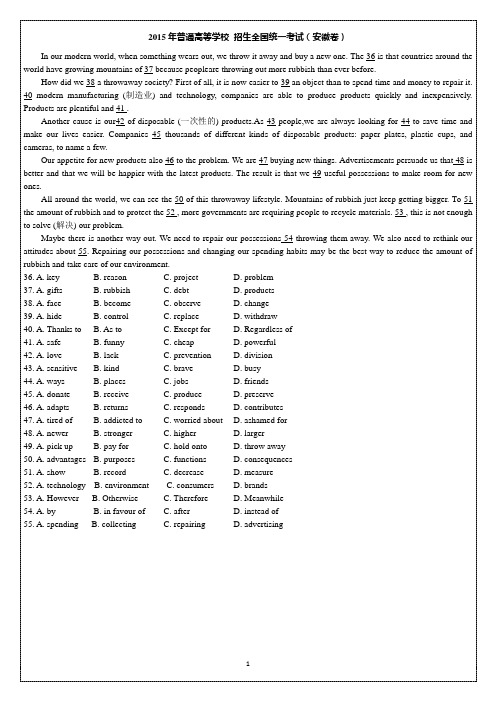
In our modern world, when something wears out, we throw it away and buy a new one. The 36 is that countries around the world have growing mountains of 37 because peopleare throwing out more rubbish than ever before.How did we 38 a throwaway society? First of all, it is now easier to 39 an object than to spend time and money to repair it.40 modern manufacturing (制造业) and technology, companies are able to produce products quickly and inexpensively. Products are plentiful and 41 .Another cause is our42 of disposable (一次性的) products.As 43 people,we are always looking for 44 to save time and make our lives easier. Companies 45 thousands of different kinds of disposable products: paper plates, plastic cups, and cameras, to name a few.Our appetite for new products also 46 to the problem. We are 47 buying new things. Advertisements persuade us that 48 is better and that we will be happier with the latest products. The result is that we 49 useful possessions to make room for new ones.All around the world, we can see the 50 of this throwaway lifestyle. Mountains of rubbish just keep getting bigger. To 51 the amount of rubbish and to protect the 52 , more governments are requiring people to recycle materials. 53 , this is not enough to solve (解决) our problem.Maybe there is another way out. We need to repair our possessions 54 throwing them away. We also need to rethink our attitudes about 55. Repairing our possessions and changing our spending habits may be the best way to reduce the amount of rubbish and take care of our environment.36. A. key B. reason C. project D. problem37. A. gifts B. rubbish C. debt D. products38. A. face B. become C. observe D. change39. A. hide B. control C. replace D. withdraw40. A. Thanks to B. As to C. Except for D. Regardless of41. A. safe B. funny C. cheap D. powerful42. A. love B. lack C. prevention D. division43. A. sensitive B. kind C. brave D. busy44. A. ways B. places C. jobs D. friends45. A. donate B. receive C. produce D. preserve46. A. adapts B. returns C. responds D. contributes47. A. tired of B. addicted to C. worried about D. ashamed for48. A. newer B. stronger C. higher D. larger49. A. pick up B. pay for C. hold onto D. throw away50. A. advantages B. purposes C. functions D. consequences51. A. show B. record C. decrease D. measure52. A. technology B. environment C. consumers D. brands53. A. However B. Otherwise C. Therefore D. Meanwhile54. A. by B. in favour of C. after D. instead of55. A. spending B. collecting C. repairing D. advertising36. D 37. B 38. B 39. C 40. A 41. C 42. A 43. D 44. A 45. C 46. D 47. B 48. A 49. D 50. D51. C 52. B 53. A 54. D 55. C【翻译】在我们现代的世界里,当有什么东西穿出来的时候,我们就把它扔了,买了一个新的。
2015年高考试卷解析全(14套)
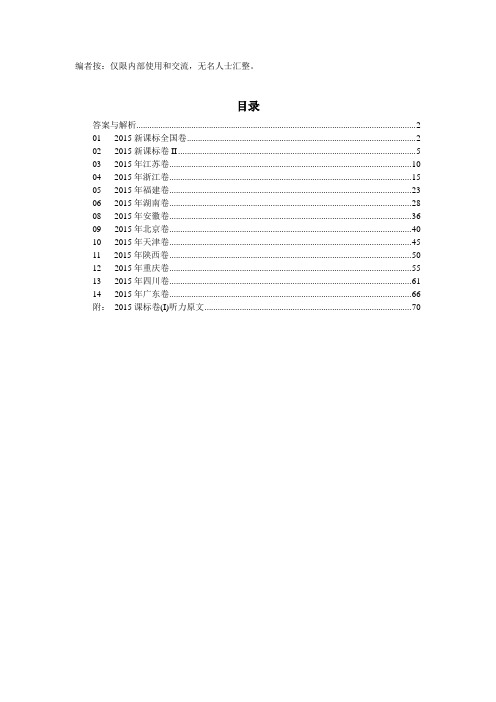
编者按:仅限内部使用和交流,无名人士汇整。
目录答案与解析 (2)01 2015新课标全国卷 (2)02 2015新课标卷II (5)03 2015年江苏卷 (10)04 2015年浙江卷 (15)05 2015年福建卷 (23)06 2015年湖南卷 (28)08 2015年安徽卷 (36)09 2015年北京卷 (40)10 2015年天津卷 (45)11 2015年陕西卷 (50)12 2015年重庆卷 (55)13 2015年四川卷 (61)14 2015年广东卷 (66)附:2015课标卷(I)听力原文 (70)答案与解析01 2015新课标全国卷解析第一部分听力1. A2. C3. A4. B5. C6. B7. A8. B9. C 10. B 11. A 12. B 13. C 14. A 15. B 16. C 17. B 18. A 19. A 20. C第二部分阅读理解第一节A【语篇解读】本文是应用文阅读。
全文讲述了每个月在伦敦运河博物馆举办的几个讲座。
包括讲座的内容、地点、联系方式等。
21.C 细节理解题。
根据文章第二段第二句James Brindley is recognized as one of the leading early canal engineers.和第二段最后一句可知Chris Lewis的讲座内容和James Brindley有关,此讲座对应的日期是November 7th,故选C项。
22.D 细节理解题。
根据题目中的February定位到第四段,该日期对应的讲座是本段的第一句An Update on the Cotswold Canals, by Liz Payne.故选D项。
23.A 细节理解题。
根据第五段第一句Eyots and Aits—Thames Islands, by Miranda Vickers. 可知,作报告的人是Miranda Vickers,故选A项。
高考英语全国卷2015II卷完形填空翻译与解析
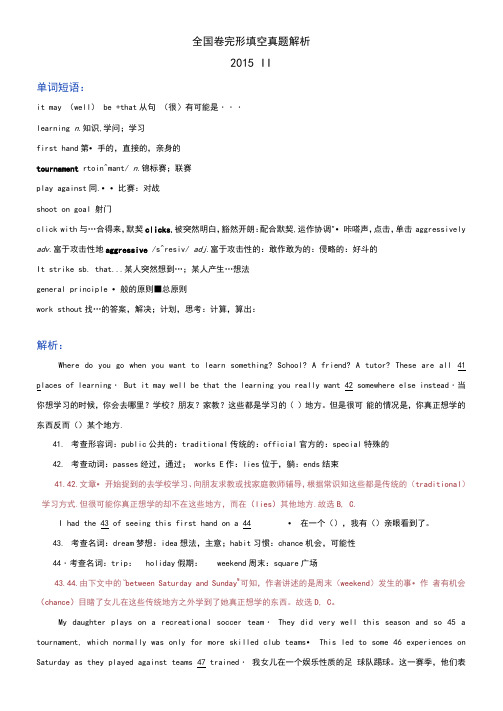
全国卷完形填空真题解析2015 II单词短语:it may (well) be +that从句(很〉有可能是・・・learning n.知识,学问;学习first hand第•手的,直接的,亲身的tournament rtoin^mant/ n.锦标赛;联赛play against同.••比赛:对战shoot on goal 射门click with与…合得来,默契clicks.被突然明白,豁然开朗:配合默契,运作协调"•咔嗒声,点击,单击aggressively adv.富于攻击性地aggressive /s^resiv/ adj.富于攻击性的:敢作敢为的:侵略的:好斗的It strike sb. that...某人突然想到…;某人产生…想法general principle •般的原则■总原则work sthout找…的答案,解决;计划,思考:计算,算出:解析:Where do you go when you want to learn something? School? A friend? A tutor? These are all 41 places of learning・ But it may well be that the learning you really want 42 somewhere else instead・当你想学习的时候,你会去哪里?学校?朋友?家教?这些都是学习的()地方。
但是很可能的情况是,你真正想学的东西反而()某个地方.41.考查形容词:public公共的:traditional传统的:official官方的:special特殊的42.考查动词:passes经过,通过; works E作:lies位于,躺:ends结束41.42.文章•开始捉到的去学校学习、向朋友求教或找家庭教师辅导,根据常识知这些都是传统的(traditional)学习方式.但很可能你真正想学的却不在这些地方,而在(lies)其他地方.故选B, C.I had the 43 of seeing this first hand on a 44 •在一个(),我有()亲眼看到了。
2015年高考英语江苏卷(含详细答案)
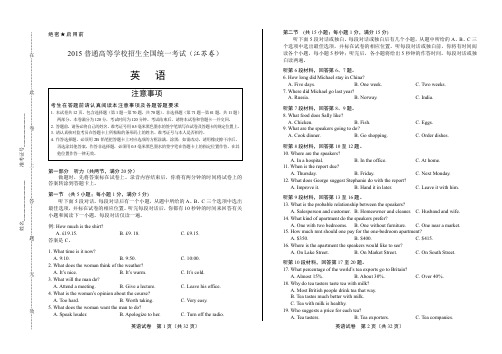
英语试卷 第1页(共34页)英语试卷 第2页(共34页)绝密★启用前2015普通高等学校招生全国统一考试(江苏卷)英语注意事项考生在答题前请认真阅读本注意事项及各题答题要求1. 本试卷共12页,包含选择题(第1题~第70题,共70题)、非选择题(第71题~第81题,共11题)两部分。
本卷满分为120分,考试时间为120分钟。
考试结束后,请将本试卷和答题卡一并交回。
2. 答题前,请务必将自己的姓名、准考证号用0.5毫米黑色墨水的签字笔填写在试卷及答题卡的规定位置上。
3. 请认真核对监考员在答题卡上所粘贴的条形码上的姓名、准考证号与本人是否相符。
4. 作答选择题,必须用2B 铅笔把答题卡上对应选项的方框涂满、涂黑;如需改动,请用橡皮擦干净后,再选涂其他答案。
作答非选择题,必须用0.5毫米黑色墨水的签字笔在答题卡上的指定位置作答,在其他位置作答一律无效。
第一部分 听力(共两节,满分20分)做题时,先将答案标在试卷上。
录音内容结束后,你将有两分钟的时间将试卷上的答案转涂到答题卡上。
第一节 (共5小题;每小题1分,满分5分)听下面5段对话。
每段对话后有一个小题,从题中所给的A 、B 、C 三个选项中选出最佳选项,并标在试卷的相应位置。
听完每段对话后,你都有10秒钟的时间来回答有关小题和阅读下一小题。
每段对话仅读一遍。
例: How much is the shirt? A. £19.15. B. £9. 18.C. £9.15.答案是C 。
1. What time is it now?A. 9:10.B. 9:50.C. 10:00. 2. What does the woman think of the weather? A. It’s nice. B. It’s warm. C. It’s cold. 3. What will the man do? A. Attend a meeting. B. Give a lecture. C. Leave his office. 4. What is the woman’s opinion about the course? A. Too hard. B. Worth taking. C. Very easy. 5. What does the woman want the man to do? A. Speak louder. B. Apologize to her.C. Turn off the radio.第二节 (共15小题;每小题1分,满分15分)听下面5段对话或独白。
2015年高考江苏卷考试说明新增词汇
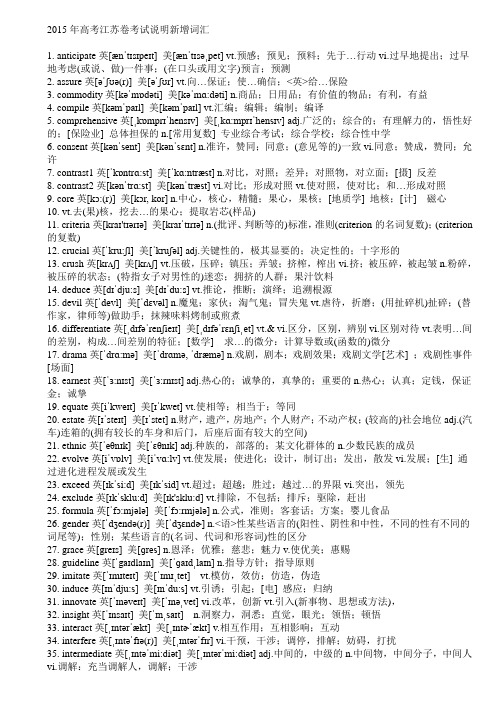
2015年高考江苏卷考试说明新增词汇1. anticipate英[ænˈtɪsɪpeɪt] 美[ænˈtɪsəˈpet] vt.预感;预见;预料;先于…行动vi.过早地提出;过早地考虑(或说、做)一件事;(在口头或用文字)预言;预测2. assure英[əˈʃʊə(r)] 美[əˈʃʊr] vt.向…保证;使…确信;<英>给…保险3. commodity英[kəˈmɒdəti] 美[kəˈmɑ:dəti] n.商品;日用品;有价值的物品;有利,有益4. compile英[kəmˈpaɪl] 美[kəmˈpaɪl] vt.汇编;编辑;编制;编译5. comprehensive英[ˈkɒmprɪˈhensɪv] 美[ˈkɑ:mprɪˈhensɪv] adj.广泛的;综合的;有理解力的,悟性好的;[保险业] 总体担保的n.[常用复数] 专业综合考试;综合学校;综合性中学6. consent英[kənˈsent] 美[kənˈsɛnt] n.准许,赞同;同意;(意见等的)一致vi.同意;赞成,赞同;允许7. contrast1英[ˈkɒntrɑ:st] 美[ˈkɑ:ntræst] n.对比,对照;差异;对照物,对立面;[摄] 反差8. contrast2英[kənˈtrɑ:st] 美[kənˈtræst] vi.对比;形成对照vt.使对照,使对比;和…形成对照9. core英[kɔ:(r)] 美[kɔr, kor] n.中心,核心,精髓;果心,果核;[地质学] 地核;[计] 磁心10. vt.去(果)核,挖去…的果心;提取岩芯(样品)11. criteria英[kraɪ'tɪərɪə] 美[kraɪˈtɪrɪə] n.(批评、判断等的)标准,准则(criterion的名词复数);(criterion的复数)12. crucial英[ˈkru:ʃl] 美[ˈkruʃəl] adj.关键性的,极其显要的;决定性的;十字形的13. crush英[krʌʃ] 美[krʌʃ] vt.压破,压碎;镇压;弄皱;挤榨,榨出vi.挤;被压碎,被起皱n.粉碎,被压碎的状态;(特指女子对男性的)迷恋;拥挤的人群;果汁饮料14. deduce英[dɪˈdju:s] 美[dɪˈdu:s] vt.推论,推断;演绎;追溯根源15. devil英[ˈdevl] 美[ˈdɛvəl] n.魔鬼;家伙;淘气鬼;冒失鬼vt.虐待,折磨;(用扯碎机)扯碎;(替作家,律师等)做助手;抹辣味料烤制或煎煮16. differentiate英[ˈdɪfəˈrenʃieɪt] 美[ˈdɪfəˈrɛnʃiˈet] vt.& vi.区分,区别,辨别vi.区别对待vt.表明…间的差别,构成…间差别的特征;[数学] 求…的微分:计算导数或(函数的)微分17. drama英[ˈdrɑ:mə] 美[ˈdrɑmə, ˈdræmə] n.戏剧,剧本;戏剧效果;戏剧文学[艺术] ;戏剧性事件[场面]18. earnest英[ˈɜ:nɪst] 美[ˈɜ:rnɪst] adj.热心的;诚挚的,真挚的;重要的n.热心;认真;定钱,保证金;诚挚19. equate英[iˈkweɪt] 美[ɪˈkwet] vt.使相等;相当于;等同20. estate英[ɪˈsteɪt] 美[ɪˈstet] n.财产,遗产,房地产;个人财产;不动产权;(较高的)社会地位adj.(汽车)连箱的(拥有较长的车身和后门,后座后面有较大的空间)21. ethnic英[ˈeθnɪk] 美[ˈɛθnɪk] adj.种族的,部落的;某文化群体的n.少数民族的成员22. evolve英[iˈvɒlv] 美[iˈvɑ:lv] vt.使发展;使进化;设计,制订出;发出,散发vi.发展;[生] 通过进化进程发展或发生23. exceed英[ɪkˈsi:d] 美[ɪkˈsid] vt.超过;超越;胜过;越过…的界限vi.突出,领先24. exclude英[ɪkˈsklu:d] 美[ɪk'sklu:d] vt.排除,不包括;排斥;驱除,赶出25. formula英[ˈfɔ:mjələ] 美[ˈfɔ:rmjələ] n.公式,准则;客套话;方案;婴儿食品26. gender英[ˈdʒendə(r)] 美[ˈdʒɛndɚ] n.<语>性某些语言的(阳性、阴性和中性,不同的性有不同的词尾等);性别;某些语言的(名词、代词和形容词)性的区分27. grace英[greɪs] 美[ɡres] n.恩泽;优雅;慈悲;魅力v.使优美;惠赐28. guideline英[ˈgaɪdlaɪn] 美[ˈɡaɪdˈlaɪn] n.指导方针;指导原则29. imitate英[ˈɪmɪteɪt] 美[ˈɪmɪˈtet] vt.模仿,效仿;仿造,伪造30. induce英[ɪnˈdju:s] 美[ɪnˈdu:s] vt.引诱;引起;[电] 感应;归纳31. innovate英[ˈɪnəveɪt] 美[ˈɪnəˈvet] vi.改革,创新vt.引入(新事物、思想或方法),32. insight英[ˈɪnsaɪt] 美[ˈɪnˈsaɪt] n.洞察力,洞悉;直觉,眼光;领悟;顿悟33. interact英[ˈɪntərˈækt] 美[ˈɪntɚˈækt] v.相互作用;互相影响;互动34. interfere英[ˈɪntəˈfɪə(r)] 美[ˈɪntərˈfɪr] vi.干预,干涉;调停,排解;妨碍,打扰35. intermediate英[ˈɪntəˈmi:diət] 美[ˈɪntərˈmi:diət] adj.中间的,中级的n.中间物,中间分子,中间人vi.调解:充当调解人,调解;干涉36. journal英[ˈdʒɜ:nl] 美[ˈdʒɜ:rnl] n.日报,日志,日记;定期刊物,期刊,杂志;[会计] 分类账37. manual英[ˈmænjuəl] 美[ˈmænjuəl] adj.用手的;手制的,手工的;[法] 占有的;体力的n.手册;指南;[乐] 键盘;[军] 刀枪操练38. overseas英[ˈəʊvəˈsi:z] 美[ˈoʊvərˈsi:z] adv.在[向] 海外,在[向] 国外adj.(在)海外的,(在)国外的;(向或来自)外国的39. proportion英[prəˈpɔ:ʃn] 美[prəˈpɔ:rʃn] n.比,比率;[数学] 比例(法);面积;相称,平衡vt.使成比例;使相称;使均衡40. ratio英[ˈreɪʃiəʊ] 美[ˈreɪʃioʊ] n.比,比率;比例;系数vt.求出比值,除,使…成比例;将(相片)按比例放大[缩小]41. reluctant英[rɪˈlʌktənt] 美[rɪˈlʌktənt] adj.不情愿的,勉强的;顽抗的;难处理的;厌恶的42. sauce英[sɔ:s] 美[sɔs] n.调味汁;酱汁;〈非〉莽撞无礼;〈俚〉烈酒vt.调味或加沙司于…;给…增加趣味或风味;〈非〉对…无礼43. undergo英[ˈʌndəˈgəʊ] 美[ˈʌndərˈgoʊ] vt.经历,经验;遭受,承受44. vision英[ˈvɪʒn] 美[ˈvɪʒən] n.视力,视觉;美景,绝妙的东西;幻影;想像力vt.在幻觉中看到;幻想,想象;梦见。
- 1、下载文档前请自行甄别文档内容的完整性,平台不提供额外的编辑、内容补充、找答案等附加服务。
- 2、"仅部分预览"的文档,不可在线预览部分如存在完整性等问题,可反馈申请退款(可完整预览的文档不适用该条件!)。
- 3、如文档侵犯您的权益,请联系客服反馈,我们会尽快为您处理(人工客服工作时间:9:00-18:30)。
2015年高考英语试题评析(江苏卷)2015年江苏省高考英语试题继续坚持“稳中有变,变中求新,立足语篇”的基本命题思路和指导思想,继续坚持英语高考改革的总体方向。
与去年相比总体难度有所下降,与2013年难度相当。
今年的试题在题型设置、考核重点、题量、难度等方面均保持了近年的命题特点,强调对考生英语基础知识的考察,符合新课标考试要求。
试题无论是在考点内容,还是在题型结构上都有全新尝试和突出亮点;无偏题、怪题,所考查的内容都是高中学生应该掌握的。
但有些试题看似容易,但要答对、得分却不易。
听力最后一段长对话戛然而止,导致部分考生心理有所影响;单选回归正常;完型难度与往年持平;阅读理解前两篇较容易,后两篇略难;任务型难度稍有下降;作文依旧延续去年新题型—任务型作文,难度适中。
总之,整份试卷有较高的区分度,试题充分体现了“重基础、显能力、扩知识”的特点,是一份高质量的试卷,对高中英语教学有很好的导向作用。
一、突出亮点1.淡化语法,突出语篇试题坚持把测试的重点定位在语篇上。
试卷中大部分内容是以语篇形式出现的,侧重对考生语篇的整体理解,侧重考查考生根据所提供的语境,综合利用有效信息解决实际问题的能力,这与英语教学大纲提出的“侧重考查学生对语篇的领悟、判断能力”,“侧重培养阅读能力”的要求是相一致的。
这一点即使在侧重考查语法知识的单项填空题型中表现得也非常明显。
今年的单选题几乎都是基础题,几乎没有具有较高难度的题目,但对语篇阅读能力要求较高,有些题是语义决定答案。
2.试题灵活,强化运用今年的英语试卷结构稳中有新,整卷无偏题、怪题,而且试题灵活。
要求考生在特定的语境中,灵活运用语法和词汇知识来完成特定的任务,较好地体现了“知识与能力并重”的思想;设题中力图体现在语境中考查对基础知识的理解和运用,几乎没有单纯考查语法知识的试题,体现了大纲所提倡的交际性和实用性。
例如:23. — Jim, can you work this Sunday?—_____ ? I’ve been working for two weeks on end.A. Why meB. Why notC. What ifD. So what (key: A)33. —Why didn’t you invite John to your birthday party?—Well, you know he’s _____ .A. an early birdB. a wet blanketC. a lucky dogD. a tough nut (key: B)3.内容时尚,挑战知识今年所选文章内容时尚、新颖,大部分都与科技前沿知识信息或学生生活紧密相关,读来令人耳目一新。
试卷还具有鼓励学生扩大以英语为载体的知识面的导向性特征。
考生不仅应该掌握基本的语言规则,还应该学会用英语来掌握更多的文化知识和科技知识,反过来也可以利用较为丰富的百科知识来提高英语理解和表达的效率。
二、试题评析一、听力今年听力理解继续采用对话和独白呈现方式,总体语速不快,容易听懂。
具体有以下特点:①与2013和2014年高考英语听力感觉差不多,语速适中,语音清晰,但是有的题目还是与2013和2014年一样,比较难以判断,容易选错;②内容涉及数字理解、天气、教育、人际交往、旅游、餐饮、工作、住房、贸易等英语日常交际信息,强调考生在常见语境中理解英语对话意义的能力,需要考生迅速建立话语交际的语境概念,分析讲话人的意图和含义;③考查形式有细节信息、语音辨析、意图推测、结论判断等题型。
二、单项选择2015年的江苏高考英语卷单选部分整体难度较去年有明显的下降,在考点分布方面,语法考查6题(定语从句1道,名词性从句1道,时态2道,虚拟语气2道)、词汇9题,和去年的语法5题、词汇10题分布持平。
语法题大多中规中矩,考点大多难度不大。
词汇方面,考查的动词短语,介词短语和单词辨析全部来源于书本。
和去年相比,今年没有出现偏、难、怪题,学生们害怕的“熟词僻义”也未有体现,如选项中用到的adjustment, judgment, appeal to, count on,comprehensive等都是基础词汇。
今年单项填空题仍坚持“突出语境,强化语义,注重运用”的命题原则,体现了试题的稳定性和连续性。
覆盖面广,综合考查了:①语法基础知识;②基础知识在特定语境中的辨别和灵活运用;③对习语固定搭配的识记和理解;④交际语用能力和谚语运用能力。
但是,对语境语义的体悟要求较高。
综合起来,主要有以下几个方面的特点。
(1)难度不大,强调基础,重灵活运用。
今年单选题可以说是江苏高考近三年来最容易的。
试题难易适中,没有偏题或怪题,基本功扎实的考生所有的题基本上都能做对。
例如:26. It is so cold that you can’t go outside _____ fully covered in thick clothes.A. ifB. unlessC. onceD. when (key: B)30. The real reason why prices _____ , and still are, too high is complex, and no short discussion can satisfactorily explain this problem.A. wereB. will beC. have beenD. had been (key: A)(2)动词仍是考查的重点。
考查动词的题有7道,占近50%。
着重考查了动词的时态、非谓语动词、动词辨析以及与其它词类的搭配。
例如:22. Schools should be lively places where individuals are encouraged to _____ to their greatest potential.A. accelerateB. improveC. performD. develop (key: D)24. Much time _____ sitting at a desk, office workers are generally troubled by health problems.A. being spentB. having spentC. spentD. spending (key: C)29. The whole team _____ Cristiano Ronaldo, and he seldom lets them down.A. wait onB. focus onC. count onD. call on (key: C)(3)语法考查语境化,常用词汇精细化。
今年单选题虽然简单,但没有削弱语境和语义对解题的制约功能,几乎每道题都与语境和语义有密切关系,更加注重对考生学以致用效果的考查。
15道题目中,6道题是直接检测考生对不同词汇在特定语境下的使用,以体现对考生英语应用能力的落地检验,让学生真正做到输入的知识能直接有效地输出。
这充分反映了高考试题不会改变对语言知识考查的立足点----从系统性、语法典型性向实用性和灵活性的转变。
例如:21. The number of smokers, _____ is reported, has dropped by 17 percent in just one year.A. itB. whichC. whatD. as (key: D)27. The university started some new language programs to _____ the country’s Silk Road Economic Belt.A. apply toB. cater forC. appeal toD. hunt for (key: B)(4)句子不长,结构简单,紧扣生活。
今年该题型的题干较为简单,没有过多的太复杂的从句或特殊句式。
绝大多数题干都在15个词汇以上,20个以下,基本没有过难的语义理解障碍,给人一种较为轻松的阅读感。
符合高考命题的要求,也考虑到了考试时间和整体题量间的平衡关系。
所有题干内容都是考生所熟悉的、能够理解的,诸如抽烟人数、学校教育、关爱别人、丝绸之路经济带、足球明星克里斯蒂亚诺•罗纳尔多等,体现了考试为教学提供正确导向的良好意识。
三、完形填空2015年江苏完型填空体裁仍然是夹叙夹议,同时延续励志人生这一经典题材。
没有难题怪题,总体来看,难度不大。
文章主要讲述作者对抗癌症的经历。
本文感情色彩清晰明了,学生做题时应该多注意选项词的感情色彩,是抑或是扬。
40,41题比较简单,学生只要认真阅读前后文,找出write, positivity 即可得知正确答案。
42题in the mood是固定搭配。
46,52题考察动词短语,检测学生基本功。
36,38,43,50,54题考察名词,44,48,49,55题考察动词,45,53题属于逻辑题,37题形容词,47题副词;题型分布很均匀,中规中矩。
四、阅读理解2015年的阅读理解题体裁多样,题材各异,选材多样化、生活化、知识化和交际化。
所取语篇的话题从科学到人文,语言地道,充满浓厚的时代气息与鲜明的语言文化特征,考查面较广。
今年所选短文文体全面,涉及了议论文、说明文和应用文;内容涉及英语国家文化的多个领域,符合新课标“所选语言材料与学生语言水平基本符合,题材、体裁丰富”的要求。
4篇阅读文章所编的考题,既考查学生的语言功底,更侧重考查学生领会文章旨意的能力。
阅读理解总体较2104年简单,篇幅较短,除了D篇之外阅读量也减轻了不少。
题量设置依旧是2,3,4,6。
A篇是信息类,B篇与去年经济类不同,讲述了电子废品的管理,阅读类型为信息讲述类,主要介绍了电子产品废弃物的产生、危害及其解决办法。
内容易理解,难度不大,58、59是细节题,考生通过找关键词,定位到原文,进行三句读就能找到与正确选项的同义替换。
如59题定位在原文的第二段,A Swiss study reported that while the weight of electronic goods represented by precious metals w as relatively small in comparison to total waste, the concentration(含量) of gold and other precious metals was higher in so-called e-waste than in naturally occurring minerals. 即可得出答案。
